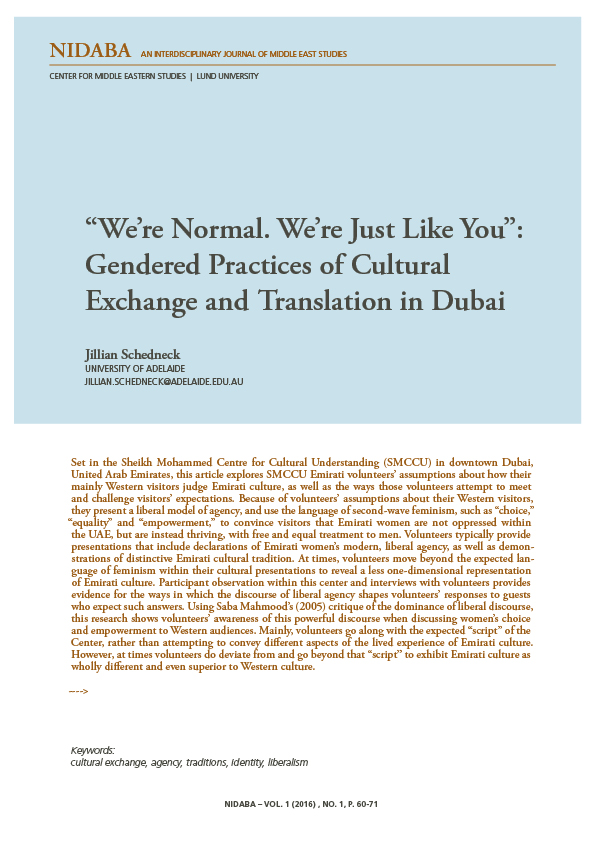Abstract
Set in the Sheikh Mohammed Centre for Cultural Understanding (SMCCU) in downtown Dubai, United Arab Emirates, this article explores SMCCU Emirati volunteers’ assumptions about how their mainly Western visitors judge Emirati culture, as well as the ways those volunteers attempt to meet and challenge visitors’ expectations. Because of volunteers’ assumptions about their Western visitors, they present a liberal model of agency, and use the language of second-wave feminism, such as “choice,” “equality” and “empowerment,” to convince visitors that Emirati women are not oppressed within the UAE, but are instead thriving, with free and equal treatment to men. Volunteers typically provide presentations that include declarations of Emirati women’s modern, liberal agency, as well as demonstrations of distinctive Emirati cultural tradition. At times, volunteers move beyond the expected language of feminism within their cultural presentations to reveal a less one-dimensional representation of Emirati culture. Participant observation within this center and interviews with volunteers provides evidence for the ways in which the discourse of liberal agency shapes volunteers’ responses to guests who expect such answers. Using Saba Mahmood’s (2005) critique of the dominance of liberal discourse, this research shows volunteers’ awareness of this powerful discourse when discussing women’s choice and empowerment to Western audiences. Mainly, volunteers go along with the expected “script” of the Center, rather than attempting to convey different aspects of the lived experience of Emirati culture. However, at times volunteers do deviate from and go beyond that “script” to exhibit Emirati culture as wholly different and even superior to Western culture.
Authors retain copyright and grant the journal right of first publication with the work simultaneously licensed under a Creative Commons Attribution License that allows others to share the work with an acknowledgement of the work's authorship and initial publication in this journal.
Authors are able to enter into separate, additional contractual arrangements for the non-exclusive distribution of the journal's published version of the work (e.g., post it to an institutional repository or publish it in a book), with an acknowledgement of its initial publication in this journal.
Authors are permitted and encouraged to post their work online (e.g., in institutional repositories or on their website) prior to and during the submission process, as it can lead to productive exchanges, as well as earlier and greater citation of published work (See The Effect of Open Access).
The journal provides open access to all accepted manuscripts in hopes of facilitating an exchange of knowldge and informed discussion about the Middle East. Publishing with Nidaba, authors agree to the terms of the Creative Commons Attribution-NonCommercial-NoDerivatives 4.0 International License, which allows others to share the work with an acknowledgement of the work's authorship and initial publication in this journal. Authors retain the copyright to their manuscript and grant the journal the right of first publication.
The content of this journal is licensed under a Creative Commons Attribution-NonCommercial-NoDerivatives 4.0 International License.

